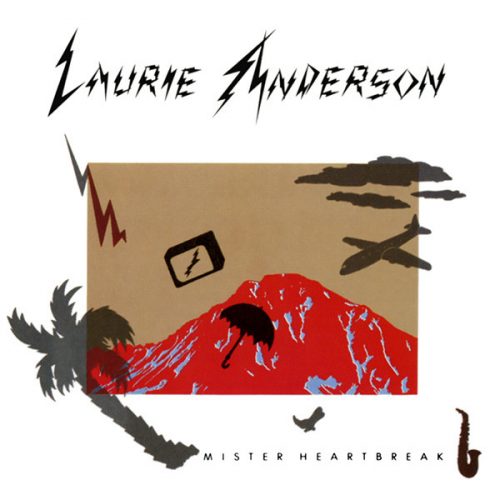The first lyric of this song–that opens Laurie Anderson’s second album, Mister Heartbreak–are:
“Sun’s coming up…like a big bald head poking over the grocery store.”
With just that, Anderson has already invited you into the world of Sharkey, whoever that person might be and wherever they are. The feeling of morning has already been fully communicated to you by the rich orchestra of generous shakers and Bill Laswell’s bass and his extra sonic doodads all culminating in the ridiculous crunch of Adrian Belew’s guitar. This is morning music, start-your-day music.
The image “like a big bald head” demonstrates Anderson’s “don’t take my serious music seriously” approach, something that has (and continues to this day) distinguished her from her peers since Big Science. It’s funny, but not as absurd as it might read: we all know exactly what she means, or maybe I’ve just looked at the cover of Terry Riley’s A Rainbow in Curved Air far too often. And the finishing lyric of the first line, “over the grocery store” completes the image: Anderson has always been interested in writing songs about human beings, cold and detached as the actual sonics may often be.
Not so cold and detached on this song, though! The aforementioned guitar distinguishes Mister Heartbreak from Anderson’s first album Big Science: if that album was characterized by the cool detachment of so much “art pop” music, then Mister Heartbreak is warm and human and just straight up rock music. “Hey! Look out! Bugs are crawling up my legs!” Laurie Anderson says at one point, and it’s one of the very few songs out there that doesn’t treat insects like pests, but as just another source of natural wonder, even though she concludes, “You know? I’d rather see this on TV. Tones it down.”
The lyrics throughout “Sharkey’s Day” aren’t ‘consistent’: images come and go as if spliced together from different notebooks. “He’s screeching tires / On an oil slick at midnight on the road to Boston a long time ago” and then suddenly Sharkey is behind the director’s chair, “At the beginning of the movie, they know they have to find each other / But they ride off in opposite directions.” Later on, Anderson portrays a humorous vision of the future: self-growing trees that cut themselves down when they reach ‘their full height’ that seems like a piece of Big Science had wandered in. But the tone certainly is, held together by the repeated hook of “I turn around, it’s fear / I turn around again, and it’s love!” to suggest that this grand gesture, this big near-8 minute art rock song, is just a love song at the end of the day.







